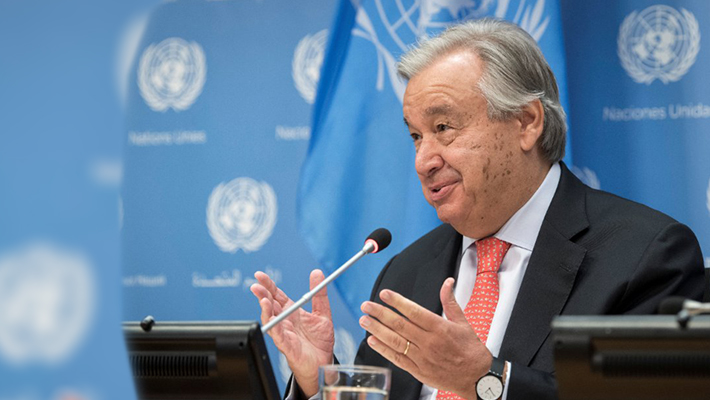By Asmau Ahmad
United Nations Secretary General, Antonio Guterres on Wednesday called for greater inclusion of women in technology and innovation, noting that women’s leadership in Science, Technology, Engineering, and Mathematics (STEM) also must be increased.
Guterres made the call at an event in UN headquarters in New York to celebrate the International Women Day (IWD), globally observed on March 8.
The theme for 2023 IWD is DigitALL: Innovation and technology for gender equality.
Guterres, represented by his Chef de Cabinet, Courtenay Rattray said that technology could also improve the lives of woman and girls around the world.
“It can expand access to education, healthcare and financial services, and also open up new pathways into business and entrepreneurship.
“But realising the promise of technology also means confronting its perils, requiring action that includes closing the so-called “connectivity gap.”
“Closing the connectivity gap as three billion people worldwide are still unconnected to the internet, mainly women and girls in developing countries.”
The secretary-general, however, called for breaking barriers that keep women and girls offline, such as stereotypes that discourage them from studying science and maths.
He added that while the internet needed to be made safe for women and girls, who are the number one targets of online hate, abuse and harassment.
The UN chief also pointed to good news, as women are at the forefront of making technology safer, more accessible, more inclusive and better regulated.
In his remarks, the President of General Assembly, Mr Csaba Kőrösi also called for greater gender inclusion in technology and innovation.
“I see this room seldom so packed and so full of energy. It is a clear indication of the noble goals that we are all celebrating and representing today,” he said.
Kőrösi highlighted the connection to the Sustainable Development Goals (SDGs), which provide the blueprint to a just and equitable future by 2030.
He said that by mid-century, 75 per cent of jobs would be related to STEM, noting that women, however, comprise just 30 per cent of the workforce in the 20 largest global tech companies in the world today.
Kőrösi stressed the need to intensify global efforts to achieve SDG 5 on gender equality and to unshackle the underused potential of the half of humanity.
“According to some evaluations, the exclusion of women from the digital world has shaved $1 trillion dollars from the GDP of the low-and middle-income countries in the last decade.
“Worse, if women and other marginalized groups are not given sufficient access to technology, we leave untapped vast additional capabilities to solve the many challenges that we are facing.”
In September 2022, Ms Doreen Bogdan-Martin was elected to lead the UN’s specialised agency for information and communication technologies (ICTs), becoming the first woman Secretary-General of the International Telecommunication Union (ITU) in its 158-year history.
“Times are changing,” she said in her keynote address, sharing stories of how young women who are using STEM, for example to increase education access for the visually impaired and to help indigenous communities fight climate change.
Bogdan-Martin reported on global momentum towards achieving universal connectivity, noting that an ITU-led coalition has mobilised more than $17 billion for “digital gender equality.”
“We also have a unique opportunity…to ensure gender equality happens in our lifetime and not in 300 years,” she said, adding that digital technology can help pave the way.
“No more excuses for not having digital gender equality now, everywhere.”
She challenged countries to get more girls into STEM, to ensure equal access to digital technologies and opportunities, and to give women a seat at the digital table and make gender equality a must in every organisation.”
For Sima Bahous, Executive Director at UN Women, technology and innovation are game changers that offer huge potential benefits.
“If used wisely they can bring us back on track for the SDGs and a more peaceful world. If misused, they can derail our efforts. This is the choice,” she cautioned.
Grasping the opportunities provided by tech, and avoiding potential harms, demands collective action by Governments, civil society, and the private sector, she added.
“Let us assert that digital rights are women’s rights,” Bahous, drawing applause from the room.
“We need to fix the institutions and the harmful gender stereotyping surrounding technology, innovation and education that fail women and girls, and continue to do so.”


